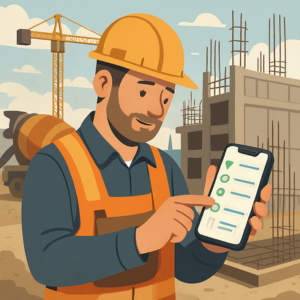DIGITAL PRODUCTS
 |
|||

The Rise of Digital Apps in the Construction Industry
The construction industry, long known for its reliance on manual processes and paper-based systems, is experiencing a digital revolution. Mobile and cloud-based apps are transforming how projects are planned, managed, and executed—especially in concrete construction, where precision, timing, and coordination are critical.
One key example is project management apps like Procore or PlanGrid. These platforms allow site managers, engineers, and contractors to track tasks, schedules, and documents in real time. In concrete construction, this means quicker approvals on formwork designs, better coordination of pour schedules, and faster issue resolution. They reduce the need for paper blueprints, physical logs, and in-person meetings—roles traditionally handled by site clerks and junior supervisors.
Concrete delivery tracking apps, such as Command Alkon, are also gaining ground. These tools let teams monitor the status of concrete trucks, mix quality, and delivery times. This ensures that pours happen at the right moment and under ideal conditions, cutting down on waste and delays. Previously, this kind of coordination relied heavily on phone calls and radio communication handled by dispatchers or logistics managers.
Another growing trend is the use of digital inspection and reporting tools, like Raken or Fieldwire. These apps let workers and inspectors log data from the field—such as slump tests, curing times, and surface conditions—right from their phones or tablets. This reduces paperwork and speeds up compliance checks, a task that used to require daily site walks and manual report writing.
While these apps don’t replace all human roles, they shift the focus from administrative and coordination tasks to strategic decision-making and oversight. As digital tools continue to evolve, construction professionals must adapt, gaining digital literacy alongside traditional building knowledge to stay competitive.
Shining a light on over 80 Construction Categories, with unlimited potential for Sub Categories - Watch our Community grow!

